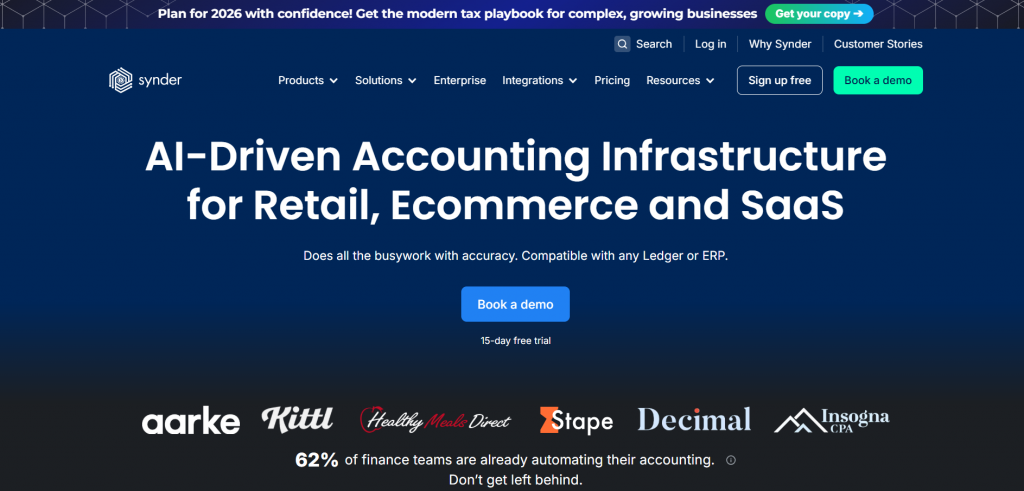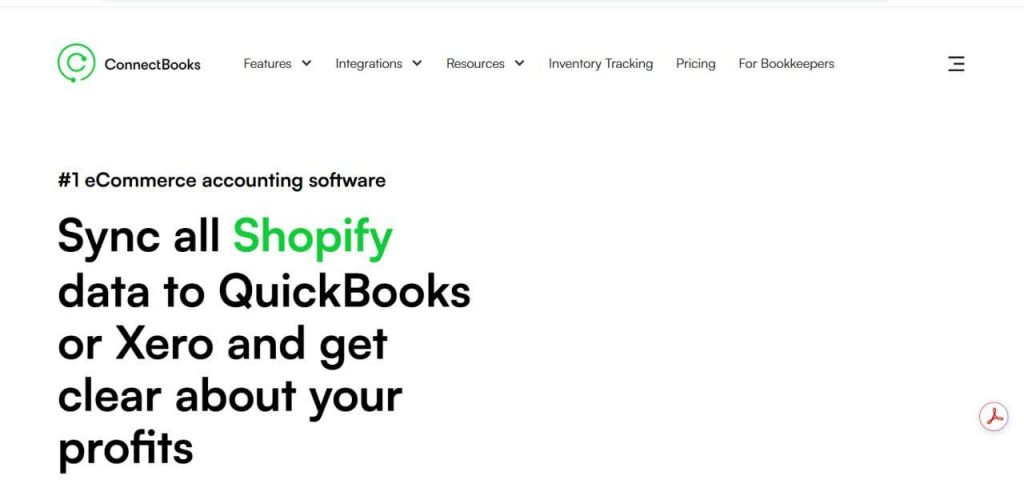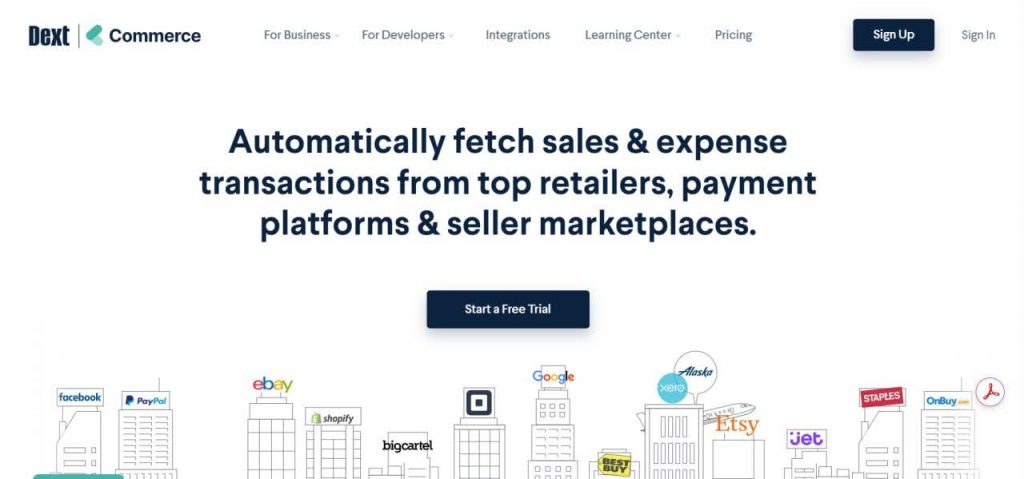The U.S. ecommerce ecosystem is accelerating. By 2027, online revenue is expected to blow past $1.7 trillion, and a massive share of that momentum is coming from the fastest-growing segment of all: small and midsize sellers who operate across multiple platforms. Every year, more entrepreneurs enter the multichannel ecommerce space, convinced (correctly) that selling in multiple places means reaching a broader customer base.
But it also means inheriting a uniquely modern headache: keeping your books straight when your revenue comes from everywhere at once, each platform reports differently and on its own timeline. As a result, a business is scaling up, but accounting is trying to hold on for dear life.
This guide breaks down what multichannel ecommerce accounting really looks like in 2026: the rules, the pitfalls, and the systems that actually keep up. You’ll learn how to manage complexity cleanly and how automation turns chaotic transaction streams into accurate books in a fraction of the time.
What is multichannel ecommerce accounting?
Multichannel ecommerce accounting is what keeps your financial world from splitting into five different universes. Every sale, refund, fee, and payout from every platform: Shopify, Amazon, Etsy, your own site, needs to land in one clean, coherent set of books. Instead of running separate ledgers for each channel (and slowly losing your mind in the process), you pull everything into a single source of truth inside your accounting system, whether that’s QuickBooks Online, Xero, QuickBooks Desktop, or Puzzle.
Here’s what makes it different from single-channel accounting. When you sell exclusively through one platform, your accounting is relatively straightforward. You’ve got one source of transactions, one fee structure, one payout schedule. But once you expand to multiple channels, you’re dealing with:
- Sales flowing in from different sales platforms simultaneously
- Different payment processors (Stripe, PayPal, Square, Shopify Payments), each with unique fee structures
- Varying payout schedules that don’t align with your actual sales dates
- Platform-specific fees like listing fees, fulfillment fees, advertising costs, and subscription charges
- Inventory that needs tracking across all channels to avoid overselling
- Tax collection requirements that differ by platform and jurisdiction
The goal is simple: get all this fragmented financial data into your accounting system accurately, so you can see your true profitability, meet tax obligations, and make informed business decisions.
Examples of multichannel ecommerce accounting
Below are three common scenarios that illustrate how multichannel accounting operates in real business environments.
Scenario 1: A growing direct-to-consumer brand
A DTC skincare company begins on one ecommerce platform and later expands into additional marketplaces and wholesale portals. Its daily financial workflow now involves:
- Online store sales processed through an integrated payment gateway, fulfilled from its own warehouse
- Marketplace orders fulfilled by a third-party logistics provider, with multiple fee types deducted before payout
- Wholesale marketplace orders subject to extended payment terms
- Occasional in-person sales processed through a mobile POS system
Each sales channel provides data using its own formats, fee logic, and payout timing. Settlement reports, invoices, and POS deposits must all be consolidated into a single accounting system to track profitability by channel and maintain an accurate view of cash flow.
Scenario 2: A multi-marketplace resale business
A company reselling vintage electronics operates across several marketplaces and its own ecommerce website. The accounting team manages:
- Different tax handling rules across platforms (some marketplaces collect and remit tax, while the company’s own site relies on external tax software)
- Unique fee structures for each marketplace
- Payout schedules that vary by platform: weekly, daily, or multi-day settlement cycles
- One-of-a-kind inventory that requires precise tracking to prevent overselling
To keep quarterly filings accurate, the business relies on bookkeeping software capable of normalizing these differences and posting clean data into its accounting system.
Scenario 3: A SaaS company with mixed revenue streams
A software provider earns revenue through multiple channels:
- Monthly subscription payments processed through a billing platform
- One-time purchases for premium add-on features
- Professional services billed through its accounting system
- Occasional marketplace sales through an app ecosystem
The company must apply proper revenue recognition for subscriptions, account for services as work is delivered, and reconcile marketplace fees against payouts. Automated transaction sync and revenue recognition tools ensure compliance with GAAP standards and provide clear visibility into recurring vs. non-recurring revenue.
Common challenges in multichannel ecommerce accounting
Expanding to multiple sales channels brings complexity that goes beyond just having more transactions to record. Here are the core challenges you’ll face.
1. Multichannel reconciliation
Reconciliation is where most multichannel sellers hit their first major roadblock. You’re you’re tracking the entire flow of money across platforms, payment processors, and bank accounts.
Here’s why it gets complicated. Let’s say you made 50 sales on Shopify yesterday, totaling $2,500. Your Shopify Payments report shows:
- Gross sales: $2,500
- Transaction fees: $75
- Net payout: $2,425
But that $2,425 doesn’t hit your bank account today. It arrives in 2 business days. Meanwhile, you also sold $1,200 worth of products on Amazon, but Amazon’s settlement period is 14 days, and they’ve deducted:
- Referral fees: $180
- FBA fees: $95
- Storage fees: $30
- Previous advertising spend: $150
- Net payout: $745
Now your bank statement shows deposits that don’t match your sales dates, and your accounting system needs to reflect what actually happened, not just what the bank shows.
Proper reconciliation automation solves this by using clearing accounts. When a sale happens, the gross amount goes to a clearing account. Fees are recorded as expenses. When the payout arrives at your bank, it’s matched against the clearing account balance. This way, your income statement shows accurate revenue and expenses, while your balance sheet reflects the timing reality of when money actually moved.
2. Sales data analytics
When you’re selling across multiple channels, understanding your actual performance requires more than looking at each platform’s dashboard. You need consolidated sales data analytics that shows:
- Which channel is most profitable after fees
- Which products sell best on which platform
- Customer acquisition costs by channel
- True gross margins after platform-specific expenses
- Seasonal trends across all channels combined
The problem is that each platform calculates metrics differently. Shopify might show you net sales (after discounts), while Amazon shows gross proceeds, and eBay reports total sales, including shipping. PayPal’s reports don’t break out which sale came from which channel if you use it across multiple platforms.
Without consolidation, you’re making decisions based on incomplete information. You might think Amazon is your most profitable channel because it generates the highest revenue, but after accounting for FBA fees, referral fees, and advertising spend, your Shopify store might actually deliver better margins.
Automated bookkeeping solves this by standardizing how transactions are recorded across all platforms, giving you apples-to-apples comparisons in your accounting system’s reports.
3. Inventory management
Inventory tracking becomes exponentially more complex when you sell the same products across multiple channels. The core challenge: keeping inventory counts synchronized so you don’t oversell on one platform because you didn’t know about a sale on another.
Here’s a typical example. You have 10 units of a popular product. You list them on:
- Your Shopify store
- Amazon FBA (5 units sent to Amazon’s warehouse)
- eBay (5 units in your warehouse)
A customer buys 3 units from your Shopify store. If your systems aren’t integrated, those 3 units are still showing as available on eBay, creating a potential overselling situation. Now multiply this across dozens or hundreds of SKUs, and you’ve got a serious problem.
From an accounting perspective, inventory management integration matters because:
- COGS (Cost of Goods Sold) must be calculated correctly for accurate profit reporting
- Inventory valuation affects your balance sheet
- Dead stock ties up cash and might need to be written down
- Inventory across multiple locations (your warehouse, Amazon FBA, dropship suppliers) needs tracking
The solution involves either a dedicated inventory management system that syncs with all your channels, or ecommerce bookkeeping software that can track inventory quantities and values as sales are recorded across platforms.
4. Tax compliance complexity
Multichannel selling creates a tax compliance nightmare if you’re not set up correctly. Different platforms handle sales tax collection in different ways, and you’re responsible for ensuring everything is reported accurately.
Here’s what you’re dealing with:
Marketplace facilitator tax: Platforms like Amazon, eBay, Etsy, Walmart, and TikTok Shop collect and remit sales tax on your behalf for sales in states where they’re required to do so. This tax never touches your bank account, as the platform keeps it and pays it to the state. But it still affects your accounting because it’s technically part of your sale.
PayPal and Stripe don’t collect sales tax automatically. You need to handle tax collection through your ecommerce platform or a tax automation service like TaxJar or Avalara, then remit it yourself.
Shopify collects tax based on your settings, but you’re responsible for configuring rates correctly and filing returns.
Your accounting system needs to accurately reflect:
- Sales tax you collected and owe (liability)
- Marketplace facilitator tax that was withheld (which shouldn’t inflate your tax liability since you didn’t collect it)
- Tax-free sales (interstate commerce, wholesale, tax-exempt customers)
Getting this wrong means your tax reports won’t match your actual obligations, potentially leading to overpayment, underpayment, or penalties.
5. Payment processor complexity
Most multichannel sellers use multiple payment processors, each with its own fee structure, payout schedule, and reporting format. This creates both accounting challenges and cash flow management issues.
Consider this common setup:
- Shopify Payments (2.9% + 30¢ per transaction, 2-day payout)
- PayPal (2.99% + 49¢ per transaction, instant transfer available for 1% fee)
- Stripe (2.9% + 30¢ per transaction, 2-day rolling payout)
- Square (2.6% + 10¢ for card-present, next-day deposit)
- Amazon Pay (handled through Amazon Seller Central, 14-day settlement)
Each processor deposits net amounts (sales minus fees) into your bank account at different times. Your accounting needs to show:
- Gross sales by channel
- Processing fees as expenses
- The timing gap between when sales happened and when you received the money
Without proper automation, you’d spend hours each week manually categorizing these transactions, trying to match deposits to sales, and ensuring fees are recorded correctly. Reconciliation automation handles this by syncing detailed transaction data from each processor and matching payouts to your bank feed automatically.
6. Platform-specific fees and expenses
Beyond payment processing fees, each sales channel charges its own unique fees that need accurate categorization. For example:
Amazon charges:
- Referral fees (typically 8–15% of sale price)
- FBA fees (fulfillment, storage, removal fees)
- Monthly professional seller subscription ($39.99)
- Advertising fees (if you use Amazon PPC)
- Long-term storage fees (for slow-moving inventory)
eBay charges:
- Insertion fees (for listing items)
- Final value fees (percentage of total sale, including shipping)
- Store subscription fees
- Promoted listings fees
- Payment processing fees
Etsy charges:
- Listing fees ($0.20 per item)
- Transaction fees (6.5% of sale price)
- Payment processing fees (3% + 25¢)
- Advertising fees (if you use Etsy Ads)
- Currency conversion fees (for international sales)
Your accounting system needs to categorize these fees correctly so you can:
- Calculate true profitability by channel
- Understand your effective commission rate per platform
- Make informed decisions about which channels to prioritize
- Track fee increases over time
Online sales tracking software that integrates with your platforms automates this categorization, ensuring fees are consistently recorded in the correct expense accounts.
Multichannel ecommerce bookkeeping software overview
Managing multichannel accounting manually is possible when you’re just starting out, but as sales volume grows, automation becomes necessary. The right software makes the difference between spending hours a month on bookkeeping versus having accurate books that update automatically.
Key features to consider
Here’s what to look for in ecommerce bookkeeping software:
- Real-time multi-platform sync: Your software should connect directly to all sales channels and payment processors, automatically pulling transactions across ecommerce platforms and payment providers.
- Flexible sync modes: Choose tools that offer both per-transaction sync for detailed tracking and summary sync for high-volume sellers who prefer cleaner, aggregated entries.
- Automated reconciliation: the system should use clearing accounts and automatically match payouts to your bank feed, ensuring accurate cash-flow reporting without manual work.
- Accurate fee categorization: Platform fees should post automatically to the correct expense accounts for clear profitability analysis.
- Tax handling and compliance: Your tool must correctly separate sales tax you collected from marketplace facilitator tax withheld by platforms, supporting multi-state tracking and filing.
- Smart rules and customization: Look for customizable rules that automate categorization, classes, locations, accounts, and other attributes based on transaction details.
- Inventory tracking integration: If your accounting system manages inventory, the software should update quantities and COGS automatically as sales occur.
- Historical data import: The solution should let you import past transactions so your books are complete from day one.
- Multi-currency support: For international sellers, the system must apply correct exchange rates and record currency gains or losses automatically.
Top ecommerce bookkeeping software options
Now that you know what features matter, let’s look at three solutions that stand out for multichannel ecommerce accounting. Each takes a different approach to automation, so the right choice depends on your business size, the platforms you sell on, and how much detail you need in your books. We’ve evaluated these based on platform coverage, sync flexibility, accuracy, and real-world results from ecommerce sellers.
1. Synder

Synder automates multichannel ecommerce bookkeeping by connecting 30+ sales platforms and payment processors with QuickBooks Online, Xero, and QuickBooks Desktop. Businesses using Synder save up to 70+ hours monthly on manual bookkeeping while achieving 99.5%+ reconciliation accuracy across all sales channels.
Key features:
- Dual sync modes: Per Transaction for detailed tracking or Summary Sync for high-volume sellers
- Smart Rules engine for unlimited custom categorization, class/location assignment, and automated workflows
- Automatic clearing account reconciliation with payout matching to bank feeds
- Proper tax handling, including marketplace facilitator tax (Amazon, eBay, Etsy, Walmart, TikTok)
- Balance Reconciliation tool to verify summaries match platform reports
- Multi-entity management for accounting firms and multi-business owners
- Reporting capabilities for real-time analytics
- Synder RevRec for GAAP-compliant revenue recognition
Pricing:
| Plan | Price (billed annually) | What’s included |
| Basic | $52/month | 1 integration, up to 500 sales transactions/mo |
| Essential | $119/month | 3 integrations, from 500 to 3,000 sales transactions/mo |
| Pro | $239/month | 10 integrations, from 3,000 to 50,000 sales transactions/mo |
| Premium | Custom | Unlimited integrations, from 50,000 sales transactions /mo |
Best for:
Synder is a good fit for ecommerce businesses selling across multiple channels that need flexible transaction handling and full detail in their books, as well as accounting firms managing multiple ecommerce clients and companies requiring audit-ready, highly customizable accounting automation.
Ready to see how Synder can automate your multichannel accounting? Book a free demo to explore how it works with your specific sales channels and accounting setup.
2. ConnectBooks

ConnectBooks specializes in Amazon and Shopify accounting with exceptional SKU-level profitability tracking and COGS reporting. Built specifically for ecommerce sellers, it provides deep visibility into product performance with advertising costs allocated down to individual SKUs.
Key features:
- SKU-level P&L reports with advertising allocated per product
- Accurate COGS tracking with costs pulled from QuickBooks or Xero
- Both itemized (per-transaction) and summary sync modes
- Advanced Amazon settlement report handling, including FBA fees
- Bundle and kit support for multi-item products
- Inventory forecasting and reorder alerts
- Automatic fee categorization for marketplace charges
Pricing:
| Plan | Price | What’s included |
| Summary | $50/month | Summary sync, basic reporting, 1 marketplace |
| Itemized | $100/month | Per-transaction sync, inventory tracking, SKU-level reports |
| Pro | $200/month | Multiple marketplaces, advanced analytics, priority support |
Best for:
ConnectBooks suits Amazon and Shopify sellers who need product-level profitability insights and detailed inventory accounting, particularly businesses focused on understanding true SKU-level margins after fees and advertising spend.
3. Dext Commerce

Dext Commerce (formerly Greenback) combines ecommerce transaction syncing with expense management in a single platform. It captures itemized sales transactions, fees, taxes, and refunds while also handling receipt and invoice processing with 99.9% data extraction accuracy.
Key features:
- Transaction-level data with itemized sales, fees, taxes, and refunds
- Data extraction accuracy using advanced OCR and AI
- Expense management with receipt capture via mobile, email, or upload
- Integrates with QuickBooks Online, Xero, Sage, and 30+ platforms
- Supports Amazon, Shopify, Etsy, eBay, Stripe, PayPal, and more
- Real-time sales data with standardized reporting
- Multi-currency transaction support
- Bank-level encryption and GDPR compliance
Pricing:
| Plan | Price | What’s included |
| Commerce Lite | $49/month | Up to 5 platforms, basic transaction sync, limited users |
| Commerce | $99/month | Unlimited platforms, full features, multiple users |
| Enterprise | Custom | Volume pricing, dedicated support, and custom integrations |
Best for:
Dext Commerce works well for businesses that need both ecommerce accounting automation and robust expense management in a single platform, especially companies selling on Amazon, Shopify, Etsy, and eBay that want to streamline receipt processing and expense tracking without using multiple tools.
Detailed comparison
| Feature | Synder | ConnectBooks | Dext Commerce |
| Supported platforms | 30+ (Amazon, Shopify, eBay, Etsy, WooCommerce, Square, Stripe, PayPal, etc.) | 6 (Amazon, Shopify, TikTok, Walmart, eBay, Etsy) | 10+ (Amazon, Shopify, Etsy, eBay, Stripe, PayPal, etc.) |
| Sync modes | Per-transaction + Summary | Per-transaction + Summary | Transaction-level only |
| Inventory tracking | Yes (per-transaction mode with full COGS) | Yes (with advanced SKU-level reporting) | Basic |
| Smart rules | Unlimited custom rules | Basic categorization | Limited AI categorization |
| Multi-currency | Full support (both modes) | Limited (itemized only) | Yes |
| Historical data import | Unlimited | Limited | Available |
| Tax handling | Advanced (marketplace facilitator tax, multi-jurisdiction) | Good (basic sales tax) | Good (automated tax calculation) |
| SKU-level profitability | Available in per-transaction mode | Excellent (advertising allocated per SKU) | Available |
| Clearing account reconciliation | Automatic | Automatic | Manual setup required |
| Revenue recognition | Yes (Synder RevRec module) | No | No |
Tips on multichannel accounting automation
Once your integrations are connected, there are a few important things to understand about how the automation handles your multichannel transactions:
Tip 1: Platform transactions will be synchronized to clearing accounts automatically created by the automation tool in your Chart of Accounts. When payouts happen, the system creates a transfer to your checking account for easy reconciliation.
Tip 2: If you accept payments via a platform’s native payment processor (like Shopify Payments), you only need to connect that platform. If you use alternative payment gateways (Stripe, PayPal, Square), make sure to connect all payment providers to get complete records of sales, fees, refunds, and payouts.
Tip 3: Each connected platform will have its own clearing account to track money flow from sale to bank deposit, ensuring accurate financial records and simple one-click bank reconciliation.
At this point, your multichannel accounting ecommerce is fully automated. Sales from all channels flow into your books accurately, fees are categorized automatically, taxes are handled properly, and bank reconciliation becomes effortless.
Conclusion
Multichannel ecommerce doesn’t get out of hand because it’s complex; it gets out of hand because too much of the work is still done manually. The moment you stop acting as the middle layer between platforms, reports, and payouts, your operations become far easier to manage than they look on paper.
Automation changes the rhythm of the business. Instead of chasing numbers, you work with reliable data the moment you need it. Accuracy becomes the default, not the outcome of long nights with spreadsheets. That shift is what lets accounting keep pace with growth instead of slowing it down.
FAQ
What is multichannel ecommerce?
Multichannel ecommerce is selling products through multiple online platforms simultaneously – marketplaces like Amazon, eBay, Etsy, social commerce channels, and your own website. This strategy increases visibility and revenue but adds complexity to accounting, inventory management, and operations.
What is ecommerce accounting?
Ecommerce accounting tracks financial transactions specific to online retail: sales revenue, platform fees, COGS, shipping costs, refunds, and sales tax. It handles digital payment processors, multiple channels, and timing differences between when sales occur and when money arrives.
How do I track sales from multiple ecommerce platforms?
Use automated bookkeeping software like Synder that connects all platforms to your accounting system. It pulls transaction data, standardizes formats, and records everything consistently in QuickBooks or Xero, giving you consolidated reports across all channels automatically.
What accounting software is best for multichannel ecommerce?
QuickBooks Online is most popular for U.S. multichannel businesses, balancing features with ease of use. Xero works well internationally. QuickBooks Desktop suits larger operations. Pair any with automation tools like Synder to handle multichannel complexity automatically.
How do I reconcile sales from multiple payment processors?
Use clearing accounts for each processor. Sales go to clearing accounts, fees record as expenses. When processors send payouts, transfers move from clearing to checking accounts. Automated software handles this automatically, matching payouts to bank feeds for one-click reconciliation.
Do I need separate books for each sales channel?
No. Consolidate all financial data into one accounting system for accurate total business performance, simplified tax compliance, and manageable reconciliation. Analyze performance by channel through proper categorization and reporting, but maintain unified books to understand the true financial position.
How does the marketplace facilitator tax affect my accounting?
Marketplace facilitator tax is collected and remitted by platforms like Amazon, eBay, and Etsy on your behalf. It never hits your bank account. Proper accounting records this separately without inflating your Sales Tax Payable, showing full transaction value while reflecting actual obligations.
Can I automate inventory tracking across multiple channels?
Yes. Per-transaction sync in automation tools updates inventory quantities and COGS automatically as sales occur. For real-time quantity synchronization across all platforms, preventing overselling, use dedicated inventory management software like Cin7 or SkuVault integrated with your channels and accounting.






